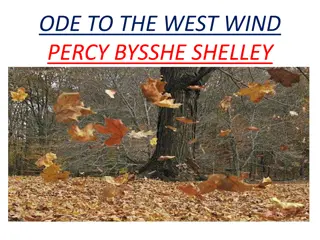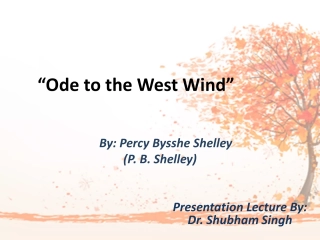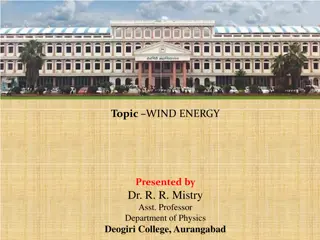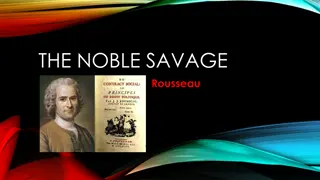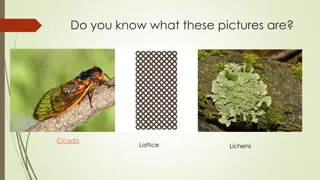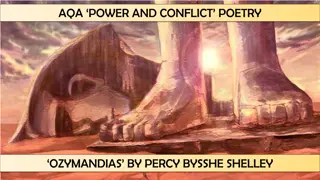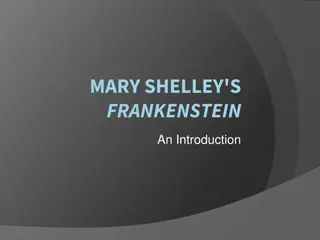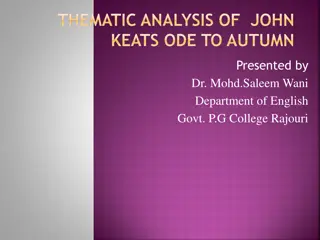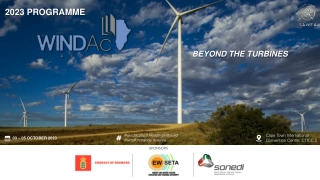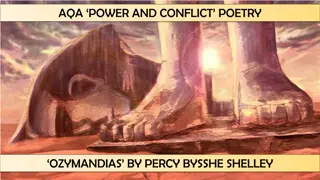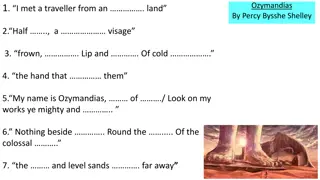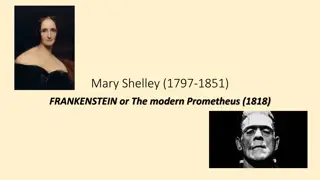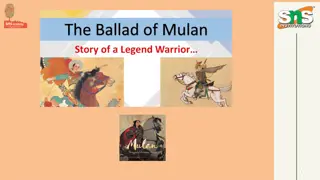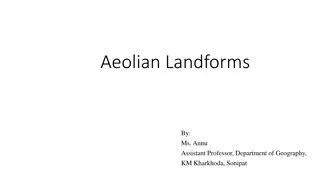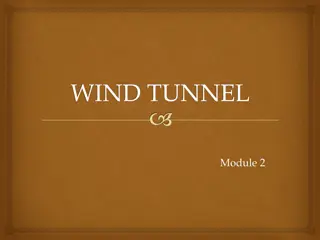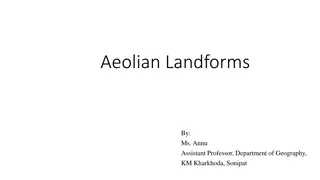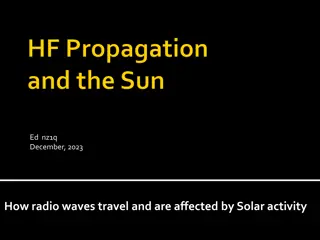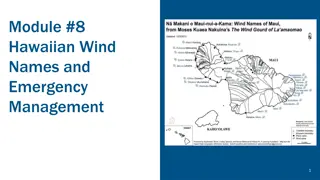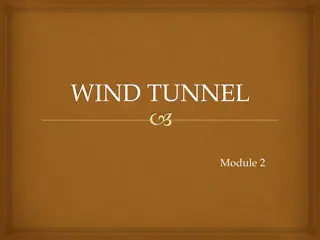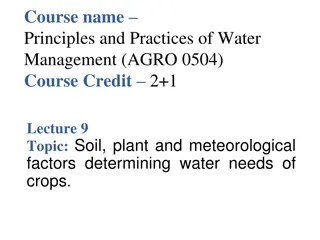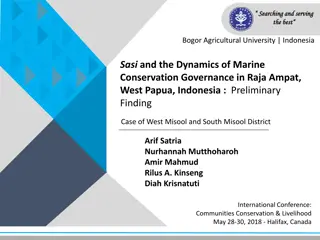Analysis of "Ode to the West Wind" by Shelley
The "Ode to the West Wind" by Percy Bysshe Shelley is a poetic exploration of the powerful and destructive force of the wind, symbolizing death and decay, yet also representing renewal and rebirth. The poem delves into themes of nature's cycles, the poet's role in promoting change and rejuvenation, and the juxtaposition of chaos and beauty. Shelley's use of vivid imagery and allegorical elements makes this ode a compelling piece in English literature.
Download Presentation

Please find below an Image/Link to download the presentation.
The content on the website is provided AS IS for your information and personal use only. It may not be sold, licensed, or shared on other websites without obtaining consent from the author. Download presentation by click this link. If you encounter any issues during the download, it is possible that the publisher has removed the file from their server.
E N D
Presentation Transcript
welcome K.DEEPA ASSISTANT PROFESSOR OF ENGLISH BON SECOURS COLLEGE FOR WOMEN THANJAVUR.
ODE TO THE WEST WIND BY SHELLEY ODE Definition of Ode An ode is a form of poetry such as sonnet or elegy. Ode is a literary technique that is lyrical in nature, but not very lengthy. You have often read odes in which poets praise people, natural scenes, and abstract ideas. Ode is derived from a Greek word aeidein, which means to chant or sing. It is highly solemn and serious in its tone and subject matter, and usually is used with elaborate patterns of stanzas. However, the tone is often formal. A salient feature of ode is its uniform metrical feet, but poets generally do not strictly follow this rule though use highly elevated theme.
INTRODUCTION OF THE POEM "Ode to the West Wind" is an ode, written by Percy Bysshe Shelley in 1819 near Florence, Italy. It was originally published in 1820 by Charles in London as part of the collection Prometheus Unbound, A Lyrical Drama in Four Acts, With Other Poems.Perhaps more than anything else, Shelley wanted his message of reform and revolution spread, and the wind becomes the trope for spreading the word of change through the poet-prophet figure. Some also believe that the poem was written in response to the loss of his son, William (born to Mary Shelley) in 1819. The ensuing pain influenced Shelley. The poem allegories the role of the poet as the voice of change and revolution. At the time of composing this poem, Shelley without doubt had the Peterloo Massacre of August 1819 in mind. His other poems written at the same time "The Masque of Anarchy", Prometheus Unbound, and "England in 1819" take up these same themes of political change, revolution, and role of the poet. According to Shelley, the poem was written in the woods outside Florence, Italy in the autumn of 1819. In the poem, the speaker directly addresses the west wind. The speaker treats the west wind as a force of death and decay, and welcomes this death and decay because it means that rejuvenation and rebirth will come soon. In the final two sections of the poem, the speaker suggests that he wants to help promote this rebirth through his own poetry and that rejuvenation he hopes to see is both political and poetic: a rebirth of society and its ways of writing.
Ode to the West Wind Themes Death and Rebirth Throughout Ode to the West Wind, the speaker describes the West Wind as a powerful and destructive force: it drives away the summer and brings instead winter storms, chaos, and even death. Yet the speaker celebrates the West Wind and welcomes the destruction that it causes because it leads to renewal and rebirth. The West Wind is not peaceful or pleasant. It is, the speaker notes, the breath of Autumn s being. Autumn is a transitional season, when summer s abundance begins to fade. So too, everywhere the speaker looks the West Wind drives away peace and abundance. The West Wind strips the leaves from the trees, whips up the sky, and causes huge storms on the ocean. And, in the first section of the poem, the speaker compares the dead leaves the West Wind blows to ghosts and pestilence-stricken multitudes. The West Wind turns the fall colors into something scary, associated with sickness and death. Similarly, the clouds in the poem s second section look like the bright hair uplifted from the head / of some fierce M nad. In Greek mythology, the M nads were the female followers of Dionysus (the god of Wine). They were famous for their wild parties and their dancing, and are often portrayed with their hair askew. The West Wind thus makes the clouds wild and drunk. It creates chaos. Unlike its sister of the Spring which spreads sweet smells and beautiful flowers the speaker associates the West Wind with chaos and death. Yet despite the destructive power of the West Wind the speaker celebrates it because such destruction is necessary for rebirth. As the speaker notes at the end of the poem s first section, the West Wind is both a destroyer and preserver. These are the traditional names of two Hindu gods, Shiva and Vishnu. Vishnu s role is to preserve the world; Shiva is supposed to destroy it. The West Wind combines these two opposite figures. As the speaker announces in the final lines "O Wind, / If Winter comes, can Spring be far behind?" the West Wind is able to merge these opposites because death is required for life, and winter for Spring. In order to have the beautiful renewal and rebirth that Spring promises, one needs the powerful, destructive force of the West Wind.
Poetry and Rebirth Throughout "Ode to the West Wind," the speaker praises and celebrates the West Wind s power it is destructive, chaotic and yet such destruction is necessary for rebirth and renewal. Indeed, the speaker so admires the wind that he wants to take, adopt, or absorb the West Wind s power s into his poetry. The speaker describes himself as a diminished person: he is chained and bowed. Far from condemning the destructive power of the wind, the speaker hopes the West Wind will revive him. At different points in the poem, the speaker has different ideas about what this might look like. Most simply, the wind simply becomes the speaker, or becomes part of him. Be thou me, the speaker tells the wind. But the speaker also proposes more complicated interactions between himself and the wind. At one point, he asks the Wind, to make me thy lyre, even as the forest is. In other words he wants to be a musical instrument, specifically the lyre, the musical instrument that poets traditionally play while they perform their poems. In this scheme, the speaker helps the wind he s like a musical accompaniment to it. The speaker doesn t take an active role, the wind does. (These roles are reinforced later when the speaker imagines the Wind driv[ing] my dead thoughts over the universe it certainly seems that the Wind is doing the real work). The speaker wants to be (or to help) the West Wind because he wants to create something new, to clear away the old and the dead. Under the West Wind s influence, his or her dead thoughts will quicken a new birth they will create something living and new. The speaker doesn t say exactly what new thing he hopes to create. It might be a new kind of poetry. Or it might be a new society. (Indeed, many readers have interpreted the poem as a call for political change). Either way, for the speaker, that newness can t be achieved through compromise with the old and dead; it can emerge only through the cleansing destruction that the West Wind brings.
General The poem "Ode to the West Wind" consists of five sections (cantos) written in terza rima. Each section consists of four tercets (ABA, BCB, CDC, DED) and a rhyming couplet (EE). The Ode is written in iambic pentameter. The poem begins with three sections describing the wind's effects upon earth, air, and ocean. In the last two sections, the poet speaks directly to the wind, asking for its power, to lift him up and make him its companion in its wanderings. The poem ends with an optimistic note which is that if winter days are here then spring is not very far.
Interpretation of the poem The poem can be divided in two parts: the first three cantos are about the qualities of the Wind and each ends with the invocation "Oh hear!" The last two cantos give a relation between the Wind and the speaker. First Canto The first stanza begins with the alliteration "wild West Wind" (line 1). The form of the apostrophe makes the wind also a personification. However, one must not think of this ode as an optimistic praise of the wind; it is clearly associated with autumn. The first few lines contain personification elements, such as "leaves dead" (2), the aspect of death being highlighted by the inversion which puts "dead" (2) at the end of the line. These leaves haunt as "ghosts" (3) that flee from something that panics them. Chariotest" (6) is the second person singular. The "corpse within its grave" (8) in the next line is in contrast to the "azure sister of the Spring" (9) a reference to the east wind whose "living hues and odours" (12) evoke a strong contrast to the colours of the fourth line of the poem that evoke death. In the last line of this canto the west wind is considered the "Destroyer" (14) because it drives the last signs of life from the trees, and the "Preserver" (14) for scattering the seeds which will come to life in the spring,
Second Canto The second canto of the poem is much more fluid than the first one. The sky's "clouds are "like earth's decaying leaves" .They are a reference to the second line of the first canto ("leaves dead", ).They also are numerous in number like the dead leaves. Through this reference the landscape is recalled again. The "clouds are "Shook from the tangled boughs of Heaven and Ocean" .This probably refers to the fact that the line between the sky and the stormy sea is indistinguishable and the whole space from the horizon to the zenith is covered with trailing storm clouds. The "clouds" can also be seen as "Angels of rain . In a biblical way, they may be messengers that bring a message from heaven down to earth through rain and lightning. These two natural phenomena with their "fertilizing and illuminating power" bring a change. Line 21 begins with "Of some fierce Maenad" and again the west wind is part of the second canto of the poem; here he is two things at once: first he is "dirge/Of the dying year" and second he is "a prophet of tumult whose prediction is decisive"; a prophet who does not only bring "black rain, and fire, and hail" , but who "will burst" it. The "locks of the approaching storm" are the messengers of this bursting: the "clouds". Shelley also mentions that when the West Wind blows, it seems to be singing a funeral song about the year coming to an end and that the sky covered with a dome of clouds looks like a "sepulchre", i.e., a burial chamber or grave for the dying year or the year which is coming to an end. Shelley in this canto "expands his vision from the earthly scene with the leaves before him to take in the vaster commotion of the skies". This means that the wind is now no longer at the horizon and therefore far away, but he is exactly above us. The clouds now reflect the image of the swirling leaves; this is a parallelism that gives evidence that we lifted "our attention from the finite world into the macrocosm". The "clouds" can also be compared with the leaves; but the clouds are more unstable and bigger than the leaves and they can be seen as messengers of rain and lightning as it was mentioned above.
Third Canto This refers to the effect of west wind in the water. The question that comes up when reading the third canto at first is what the subject of the verb "saw" (33) could be. On the one hand there is the "blue Mediterranean" (30). With the "Mediterranean" as subject of the canto, the "syntactical movement" is continued and there is no break in the fluency of the poem; it is said that "he lay, / Lull'd by the coil of his crystalline streams, / Beside a pumice isle in Baiae's bay, / And saw in sleep old palaces and towers" (30 33). On the other hand, it is also possible that the lines of this canto refer to the "wind" again. Then the verb that belongs to the "wind" as subject is not "lay", but the previous line of this canto, that says Thou who didst waken ... And saw" (29, 33). But whoever the "Mediterranean" or the "wind" "saw" (33) the question remains whether the city one of them saw, is real and therefore a reflection on the water of a city that really exists on the coast; or the city is just an illusion. Pirie is not sure of that either. He says that it might be "a creative you interpretation of the billowing seaweed; or of the glimmering sky reflected on the heaving surface". Both possibilities seem to be logical. To explain the appearance of an underwater world, it might be easier to explain it by something that is realistic; and that might be that the wind is able to produce illusions on the water. With its pressure, the wind "would waken the appearance of a city". From what is known of the "wind" from the last two cantos, it became clear that the wind is something that plays the role of a Creator. Whether the wind creates real things or illusions does not seem to be that important. Baiae s bay (at the northern end of the Gulf of Naples) actually contains visible Roman ruins underwater (that have been shifted due to earthquakes.) Obviously the moss and flowers are seaweed. It appears as if the third canto shows in comparison with the previous cantos a turning-point. Whereas Shelley had accepted death and changes in life in the first and second canto, he now turns to "wistful reminiscence [, recalls] an alternative possibility of transcendence". From line 26 to line 36 he gives an image of nature. But if we look closer at line 36, we realise that the sentence is not what it appears to be at first sight, because it obviously means, so sweet that one feels faint in describing them. This shows that the idyllic picture is not what it seems to be and that the harmony will certainly soon be destroyed. A few lines later, Shelley suddenly talks about "fear" . This again shows the influence of the west wind which announces the change of the season.
Fourth Canto Whereas the cantos one to three began with "O wild West Wind" and "Thou" (15, 29) and were clearly directed to the wind, there is a change in the fourth canto. The focus is no more on the "wind", but on the speaker who says "If I ..." (43 44). Until this part, the poem has appeared very anonymous and was only concentrated on the wind and its forces so that the author of the poem was more or less forgotten. Pirie calls this "the suppression of personality" which finally vanishes at that part of the poem. It becomes more and more clear that what the author talks about now is himself. That this must be true, shows the frequency of the author's use of the first-person pronouns "I" (43 44, 48, 51, 54), "my" (48, 52), and "me" (53). These pronouns appear nine times in the fourth canto. Certainly the author wants to dramatise the atmosphere so that the reader recalls the situation of canto one to three. He achieves this by using the same pictures of the previous cantos in this one. Whereas these pictures, such as "leaf", "cloud", and "wave" have existed only together with the wind, they are now existing with the author. The author thinks about being one of them and says "If I were a . . ." (43 ff.). Shelley here identifies himself with the wind, although he knows that he cannot do that, because it is impossible for someone to put all the things he has learned from life aside and enter a "world of innocence". That Shelley is deeply aware of his closedness in life and his identity shows his command in line 53. There he says "Oh, lift me up as a wave, a leaf, a cloud" (53). He knows that this is something impossible to achieve, but he does not stop praying for it. The only chance Shelley sees to make his prayer and wish for a new identity with the Wind come true is by pain or death, as death leads to rebirth. So, he wants to "fall upon the thorns of life" and "bleed" (54). At the end of the canto the poet tells us that "a heavy weight of hours has chain'd and bow'd" (55). This may be a reference to the years that have passed and "chained and bowed" (55) the hope of the people who fought for freedom and were literally imprisoned. With this knowledge, the West Wind becomes a different meaning. The wind is the "uncontrollable" (47) who is "tameless" . One more thing that one should mention is that this canto sounds like a kind of prayer or confession of the poet. This confession does not address God and therefore sounds very impersonal. Shelley also changes his use of metaphors in this canto. In the first cantos the wind was a metaphor explained at full length. Now the metaphors are only weakly presented "the thorns of life" (54). Shelley also leaves out the fourth element: the fire. In the previous cantos he wrote about the earth, the air and the water. The reader now expects the fire but it is not there. This leads to a break in the symmetry.
Fifth Canto Again and again the wind is very important in this last canto. At the beginning of the poem the wind was only capable of blowing the leaves from the trees. In the previous canto the poet identified himself with the leaves. In this canto the wind is now capable of using both of these things mentioned before. Everything that had been said before was part of the elements wind, earth, and water. Now the fourth element comes in: the fire. There is also a confrontation in this canto: Whereas in line 57 Shelley writes "me thy", there is "thou me" in line 62. These pronouns appear seven times in the fifth canto. This "signals a restored confidence, if not in the poet s own abilities, at least in his capacity to communicate with [. . .] the Wind". It is also necessary to mention that the first-person pronouns again appear in a great frequency; but the possessive pronoun "my" predominates. Unlike the frequent use of the "I" in the previous canto that made the canto sound self-conscious, this canto might now sound self-possessed. The canto is no more a request or a prayer as it had been in the fourth canto it is a demand. The poet becomes the wind's instrument, his "lyre" (57). This is a symbol of the poet's own passivity towards the wind; he becomes his musician and the wind's breath becomes his breath. The poet's attitude towards the wind has changed: in the first canto the wind has been an "enchanter" (3), now the wind has become an "incantation" (65). And there is another contrast between the two last cantos: in the fourth canto the poet had articulated himself in singular: "a leaf" (43, 53), "a cloud" (44, 53), "A wave" (45, 53) and "One too like thee" (56). In this canto, the "sense of personality as vulnerably individualised led to self-doubt" and the greatest fear was that what was "tameless, and swift, and proud" (56) will stay "chain'd and bow'd" (55). The last canto differs from that. The poet in this canto uses plural forms, for example, "my leaves" (58, 64), "thy harmonies" (59), "my thoughts" (63), "ashes and sparks" (67) and "my lips" (68). By the use of the plural, the poet is able to show that there is some kind of peace and pride in his words. It even seems as if he has redefined himself because the uncertainty of the previous canto has been blown away. The "leaves" merge with those of an entire forest and "Will" become components in a whole tumult of mighty harmonies. The use of this "Will" (60) is certainly a reference to the future. Through the future meaning, the poem itself does not only sound as something that might have happened in the past, but it may even be a kind of "prophecy" (69) for what might come the future. At last, Shelley again calls the Wind in a kind of prayer and even wants him to be "his" Spirit: "My spirit! Be thou me, impetuous one!" (62). Like the leaves of the trees in a forest, his leaves will fall and decay and will perhaps soon flourish again when the spring comes. That may be why he is looking forward to the spring and asks at the end of the last canto "If Winter comes, can Spring be far behind?" (70). This is of course a rhetorical question because spring does come after winter, but the "if" suggests that it might not come if the rebirth is strong and extensive enough, and if it is not, another renewal spring will come anyway. Thus the question has a deeper meaning and does not only mean the change of seasons, but is a reference to death and rebirth as well. It also indicates that after the struggles and problems in life, there would always be a solution. It shows us the optimistic view of the poet about life which he would like the world to know. It is an interpretation of his saying, If you are suffering now, there will be good times ahead. But the most powerful call to the Wind are the lines: "Drive my dead thoughts over the universe/like withered leaves to quicken a new birth!" Here Shelley is imploring or really chanting to the Wind to blow away all of his useless thoughts so that he can be a vessel for the Wind and, as a result, awaken the Earth.
Conclusion This poem is a highly controlled text about the role of the poet as the agent of political and moral change. This was a subject Shelley wrote a great deal about, especially around 1819, with this strongest version of it articulated the last famous lines of his "Defence of Poetry": "Poets are the hierophants of an unapprehended inspiration; the mirrors of the gigantic shadows which futurity casts upon the present; the words which express what they understand not; the trumpets which sing to battle, and feel not what they inspire; the influence which is moved not, but moves. Poets are the unacknowledged legislators of the world."
Lines 32-36 Meanwhile the rural ditties were not mute, Tempered to the oaten flute; Rough Satyrs danced, and Fauns with cloven heel From the glad sound would not be absent long. And old Damoetas loved to hear our song. The speaker tells us that he and Lycidas would compose songs or poems ("ditties") to the tune of an "oaten flute" (a pipe made from the stem of an oat). Sounds like good times out on the lawn. Various mythological creatures, like satyrs and fauns danced along to their tunes; they couldn't resist, not even Damoetas. For all you pastoral poetry experts out there (anyone?), the name Damoetas just might sound familiar. It's a name often used in pastoral poetry for a shepherd, and Virgil, whose work inspired Milton, used it in his Eclogues. "Tempered" means "in harmony with" or "attuned to." "Rural ditties" might be a reference to the type of pastoral poetry found in "Lycidas." If we had any doubt before, the mention of satyrs and fauns seals the deal: we have entered into a dreamy, mythological world, one that is very different from Milton's real England.
Lines 37-38 But O! the heavy change now thou art gone, Now thou art gone and never must return! All right, pal, the time for daydreaming is over. He has undergone a "heavy change" because Lycidas has passed away. No more frolicking on the lawn, no more boogieing with the satyrs. It's time to face a very different kind of music. Note the repetition of "now thou art gone." Our speaker can't seem to get over the loss of his friend. He even tops it off with an exclamation mark. Now that's some serious business.
Lines 39-41 Thee, Shepherd, thee the woods, and desert caves, With wild thyme and the gadding vine o'ergrown, And all their echoes mourn. Another apostrophe. Here, our speaker talks to Lycidas directly. The problem is, the dude is dead, so he's not actually around to hear our speaker. In talking to Lycidas, he tells him just how much his death has affected the natural world. Even the caves (which are overgrown with "wild thyme" and "gadding vine") and the woods mourn his death. "Gadding" means "wandering" or "roving." You may have noticed that the structure of these lines is a wee bit tricky. The verb ("mourn") comes in the last line, but its object ("thee," referring to the shepherd Lycidas) is in the first. In between the object and its verb comes the description of the caves ("o'ergrown" with "wild thyme" etc.). These lines are also an example of personification. The speaker is giving non-human things, like caves and woods, human qualities in this case, emotions.
Lines 42-44 The willows, and the hazel copses green, Shall now no more be seen Fanning their joyous leaves to thy soft lays. It's not just the caves and woods that are bummed out about Lycidas' death. The willows and the hazel trees are down in the dumps, too. How do we know those trees are sad? Well, they aren't shaking their tail feathers oops, we mean "leaves" to the rhythms of Lycidas' righteous tunes, or "lays." A "lay" is a short poem or narrative meant to be sung; usually, it is a synonym for poetry.
Lines 45-49 As killing as the canker to the rose, Or taint-worm to the weanling herds that graze, Or frost to flowers, that their gay wardrobe wear, When first the white-thorn blows; Such, Lycidas, thy loss to shepherd's ear. Yikes. We've got a very complex sentence here. Basically, we can think of these lines as a bunch of similes strung together. Something is "as killing as the canker to the rose." A canker is a disease that infests rose plants. Uh oh. That same something is like a "taint-worm to the weanling herds." A "taint-worm" is an intestinal worm that kills young (or "weanling") calves. Pause for "ew"s. And finally, that same something is as deadly as frost is to blooming (as in, wearing their "gay wardrobe") flowers. What's that something? Lycidas' death. Just in case you were still in the dark: Lycidas' death was very very bad to our speaker. Very bad. This sequence of lines is a simile, except instead of saying "Lycidas' death was like " the speaker inverts the order .
Line 50-51 Where were ye, Nymphs, when the remorseless deep Closed o'er the head of your loved Lycidas? The speaker wonders where the nymphs who supposedly love Lycidas were when he drowned in the ocean, which he calls "the remorseless deep." He's addressing these nymphs directly, as though he wants to call them out. He is none too pleased with their behavior. Not cool, nymphs.
Lines 52-55 For neither were ye playing on the steep Where your old bards, the famous Druids, lie, Nor on the shaggy top of Mona high, Nor yet where Deva spreads her wizard stream. The speaker says the nymphs weren't at any of their normal hangouts when Lycidas was drowning. What are those normal hangouts? Well, they should have been on the "steep," which refers to a pinnacle or mountain. The phrase "old bards, the famous Druids, lie" tells us that this mountain just might be located on an island called Bardsey, off the north coast of Wales. In Milton's time, it was rumored that 20,000 saints were buried there. Druids were priests in the pre-Roman Celtic cultures of Ireland, Wales, England, etc. We don't know much about them, and neither did Milton, but they have become the stuff of legend. In some traditions, they were viewed as priests of Apollo, which explains why Milton relates them to the nymphs. And these nymphs weren't on the "shaggy top of Mona" either. No, he's not talking about a bad haircut on a girl. In this case, Mona probably refers to the Isle of Anglesey, an island off the northwest coast of Wales. It was thought to have been inhabited by druids at one point, too. Lastly, the nymphs weren't near the Deva, either. Deva refers to the Dee, a river that runs through Wales and England, and partly marks the border between them. "Wizard" here means enchanted or magical. Sounds like quite the river.
Lines 56-57 Ay me, I fondly dream! Had ye been there, for what could that have done? This speaker has a habit of being lost in daydreams, only to shake himself out of them when he remembers the cruel fact of Lycidas' death. His use of the exclamation shocks us out of our reverie, too. After calling out the nymphs for not being where a jolly old Englishman might usually find them, the speaker realizes he shouldn't blame the nymphs; that's just fantasizing ("I fondly dream"). He seems to think that they wouldn't have been able to do anything even if they had been there, a point he makes by asking another rhetorical question.
Lines 58-63 What could the Muse herself that Orpheus bore, The Muse herself for her enchanting son, Whom universal nature did lament, When, by the rout that made the hideous roar, His gory visage down the stream was sent, Down the swift Hebrus to the Lesbian shore? As evidence that the nymphs couldn't have prevented Lycidas' death, the speaker alludes to the story of Orpheus, a poet in Greek mythology whose mother (the Muse Calliope) wasn't able to save him from being dismembered and washed downstream by the "rout that made the hideous roar." These lines are tough, but here's a way you might paraphrase them: "what could the muse that mothered Orpheus, [what could] the muse herself [do] for her son whom nature mourned, when his head was sent down the river Hebrus by a group of hooligans who had it out for him?" Who were those hooligans? Well, it might help to know some background on this Orpheus dude. For more info, check out Shmoop's page on Orpheus and Eurydice. Hebrus is the Ancient Greek name for a river that runs through modern-day Bulgaria, Greece, and Turkey. And "Lesbian shore" refers to the island of Lesbos, off the coast of Greece. That's a pretty long, complicated allusion. But really, all the speaker is saying here is that if even Calliope couldn't save her own son, why should he expect the Muses to have saved Lycidas? Maybe he should cut them some slack
Lines 64-66 Alas! what boots it with uncessant care To tend the homely slighted shepherd's trade, And strictly meditate the thankless Muse We've got another exclamation to open these lines. Our speaker is all kinds of unhappy. Shmooptionary to the rescue: "Boots" here is a verb, meaning something like to profit, or to gain. And "uncessant" is just an older spelling of incessant, or without stopping. Essentially, in these lines, the speaker is wondering what he would gain by continuing to live like a shepherd (without good old Lycidas by his side), and dwelling, or "strictly meditat[ing]" on the fact that the Muse does not seem interested in helping him out (in other words, she is "thankless"). We can't help but thinking that he probably doesn't have much to gain at all, the poor guy. You know what's interesting here? Earlier, when the speaker was describing the shepherd's life, it sounded pretty awesome, right? He and Lycidas frolicked with the fauns and salsaed with the satyrs. But now that life seems not-so-great; in fact, it's "homely" and "slighted" (or ugly, and ignored). What's the point anymore?
Lines 67-69 Were it not better done as others use, To sport with Amaryllis in the shade, Or with the tangles of Neaera's hair? In other words: Wouldn't it be better to "sport with Amaryllis" and the "tangles of Neaera's hair" like everyone else ("better done as others use") than think about the muse and live the difficult life of a shepherd? Okay, now we understand the question, but do we actually know what he's asking? It might help to get a little background: Amaryllis is a shepherdess who appears in the work of several ancient pastoral poets, most notably Virgil (in the Eclogues) and Theocritus (in the Idylls). Neaera is another nymph who pops up in pastoral poetry; she appears in Virgil's Eclogues and the work of several later poets. The "tangles" of her hair are always mentioned. May we recommend conditioner? Here, the speaker builds on the idea he introduced in the previous lines: He might have a better time of it if he ditched the shepherd life and took up with some nymphs. Maybe then he could get over the loss of his buddy.
Lines 70-72 Fame is the spur that the clear spirit doth raise (That last infirmity of noble mind) To scorn delights, and live laborious days; For the past few lines, the speaker has been asking the age-old question: Why bother? Now, he gives us the answer. The speaker is saying that the only we reason we "scorn delights" (like hanging out with Amaryllis and Neaera) and live a life of labor is because the prospect of fame "spur[s]" us on. Milton has always been a fan of strange syntax, and these lines are no exception. When you read "Fame is the spur that the clear spirit doth raise," it sounds like the clear spirit is raising the spur of fame, right? Wrong. It actually means that the spur of fame raises the clear spirit. Funky, huh? Basically, he is using a metaphor to say that fame prods the spirit to action, much like a spur prods a horse to move. Awesome. We have that part down. Now what's this "last infirmity of noble mind" all about? Well, that phrase modifies fame, which means that fame is something that makes a noble mind sick. If you think about it, that makes perfect sense. If noble people get caught up in trying to be famous, they probably will ignore fun things and focus too hard on their work. Wait, but people become famous now for all kinds of "delights." And many famous people have barely done any work at all. True, but in Milton's day, you became famous through your work. Milton wanted to be a very famous poet, so he probably scorned a fair number of delights in his day, and focused only on toiling away at the pen. Again, he is continuing the idea he started a few lines ago: shepherding is no longer the fun it used to be, when Lycidas was around. Now it sounds like tough work.
Lines 73-76 But the fair guerdon when we hope to find, And think to burst out into sudden blaze, Comes the blind Fury with th' abhorred shears, And slits the thin-spun life. [ ] This fame thing is pretty fickle. In fact, it's downright elusive. The speaker continues talking about the elusiveness of fame: When we think we've finally found it, or that our time has come ("and think to burst out into sudden blaze"), Fate comes and kills us. A "guerdon" is a reward, which means that fame is presented as a reward. The problem is, just when we think we have found that guerdon, "blind Fury," or fate, comes to take it away. How does fate rob us of fame? With its "shears" that can easily cut through the flimsy, or "thin-spun" material that is human life. In other words, just when Lycidas was about to "burst out in a sudden blaze" (now there's an image) of fame, fate intervened and killed him. Tough break. This "blind Fury," by the way, is yet another classical allusion to Greek mythology. The Fates, of which this Fury in an example, were three female figures who were in charge of determining how long a person would live. The specific Fury, or Fate that our speaker is referring to here is probably Atropos, who was the one in charge of cutting the "thread" with "abhorred shears," which ended a person's life.
Lines 76-77 [ ] But not the praise, Phoebus replied, and touched my trembling ears; Enter Apollo, the Greek god of the sun, music, and poetry, among all kinds of other things (the Greek gods were major multitaskers). In these lines, he's called by his Roman name, Phoebus. Phoebus tells the speaker that while the "blind Fury" does destroy human life, she doesn't destroy all the praise we get for our achievements (especially the poetic ones, right?). He says this while touching the speaker on the ears. What's up with that, you ask? Well, it's an allusion to Virgil's Eclogues, in which the speaker's ears are touched as well. It's a form of admonishment, or scolding. Essentially, Phoebus is telling our hotheaded speaker to cool his jets.
Lines 78-80 Fame is no plant that grows on mortal soil, Nor in the glistening foil Set off to the world, nor in broad rumour lies, Phoebus describes Fame as something that cannot be found in this mortal world ("soil"), and especially not in one's reputation or "rumour." Wait. What? Essentially, Phoebus is telling our guy that fame isn't about how many people on earth know and respect you. "Foil" here refers to a piece of silver or gold placed under a precious stone to enhance its luster (presumably for display purposes). In this sense, a foil creates an illusion, the same way that looking for fame on earth does. We might think of these lines as a kind of negative metaphor. Fame is not a plant, and it's not a foil. Awesome. Wait. What is it, then?
Lines 81-84 But lives and spreads aloft by those pure eyes, And perfect witness of all-judging Jove; As he pronounces lastly on each deed, Of so much fame in heaven expect thy meed. Phoebus tells the speaker that fame actually "lives" and grows, or "spreads" aloft as a result of Jove's decisions. Jove has the final word, as he "pronounces lastly on each deed." Here, fame is metaphorically compared to a tree or plant that grows in heaven, provided Jove allows it to, of course. Remember the word "meed" from line 14? Here it means about the same thing: a fitting reward. The idea here is that Jove will give us however much fame in heaven we deserve.
Lines 88-92 But now my oat proceeds, And listens to the herald of the sea That came in Neptune's plea, He asked the waves, and asked the felon winds, What hard mishap hath doomed this gentle swain? Oat? Is he talking about a piece of grain with ears, toddling along, listening to the ocean? We wish. No, he's talking about his song, the pastoral poem he's writing. "Oat" is a stand-in for a musical instrument made out of an oat-stalk, like the "oaten reed" he mentioned way back in line 33. When he says "my oat proceeds," the speaker means he is continuing his song. He describes how Triton, the "herald of the sea," comes to defend ("came in [ ] plea") Neptune, who is the god of the sea, from the charge of Lycidas' death. Milton's friend Mr. King drowned in the ocean, so it makes sense that our speaker might blame the god of the sea for his friend's death. But Triton isn't having it. In fact, Triton wants to understand what went down, too. So he asks the waves and the savage (or "felon") winds what happened to Lycidas, the "gentle swain." Sure Triton, just blame it on the weather, why don't you?
Lines 93-99 And questioned every gust of rugged wings That blows from off each beaked promontory: They knew not of his story, And sage Hippotades their answer brings, That not a blast was from his dungeon strayed; The air was calm, and on the level brine Sleek Panope with all her sisters played. This Triton dude is all about getting some answers. He also asked the "wings" blowing from pointed ("beaked") promontories (a piece of land jutting out into the sea), and they didn't know anything about Lycidas' story. These wings might be a synecdoche for birds, flying from sea-cliffs, or perhaps it's just referring to the wind. Who is this Hippotades guy? Well, that's just another name for Aelous, the god of the winds. He kept the winds stored in a cave ("dungeon") and tells the speaker that all of his winds were at home when Lycidas died, so they couldn't have had anything to do with the tragedy. Hippotades also says that the "air was calm," and Panope, one of fifty sea Nereids, was seen playing on the calm ("level") sea, or "brine."
Lines 100-102 It was that fatal and perfidious bark, Built in the eclipse, and rigged with curses dark, That sunk so low that sacred head of thine. "Perfidious bark"? Is there a dog around? Perfidious means deceitful, or untrustworthy, and bark is another word for ship. Here, our speaker is saying that the ship is to blame for Lycidas' death, not the winds or the sea. The ship is what "sunk so low that sacred head of thine." In other words, "The ship is what drowned you, Lycidas." Eclipses were once considered evil omens, and the speaker implies that because the ship was built during one it was "rigged with curses dark," which caused Lycidas' death. Let that be a lesson, all you shipbuilders out there.
Lines 103-107 Next Camus, reverend sire, went footing slow, His mantle hairy, and his bonnet sedge, Inwrought with figures dim, and on the edge Like to that sanguine flower inscribed with woe. "Ah! Who hath reft" (quoth he) my dearest pledge?" Camus appears, another word for the river Cam (which runs near Cambridge University, the home of Milton and King). The speaker personifies the river by saying that it is clearly mourning for Lycidas it is "inscribed with woe." He also asks who has taken ("reft") his dearest "pledge." The river wants to know who has taken Lycidas. The speaker goes even further with his personification, describing Camus as a university student, complete with a furry academic gown ("mantle hairy") and wearing a "bonnet sedge." A "sedge" is a rush-like plant that grows near water. The bonnet is compared to the "sanguine flower," the hyacinth. In Greek mythology, a Spartan youth named Hyacinthus was accidentally killed while playing with Apollo, god of the sun, music, and poetry. According to one myth, hyacinth flowers sprung up from his blood that was spilled. Supposedly, the flower was marked with the Greek word "AI," which translates to "alas," which is a pretty woeful word, if we may say so.
Lines 108-112 Last came, and last did go, The Pilot of the Galilean lake. Two massy keys he bore of metals twain, (The golden opes, the iron shuts amain) He shook his mitred locks, and stern bespake "The Pilot of the Galilean lake" refers to none other than Saint Peter, one of Jesus' star disciples. In these lines, he appears (the last of all the figures that have appeared before our speaker) with two keys made of two different kinds of metal and begins to speak. The golden key opens the gates (presumably to heaven) while the iron one shuts them quickly, or "amain." This is a reference to the fact that Saint Peter was the guy in charge upstairs; according to the Bible, he held the keys to the kingdom of heaven (Matthew 16:17- 20). A miter, by the way, is a type of headdress or cap worn by certain religious figures. To have "mitred locks" means that Peter's hair is stuffed up underneath a miter, which makes sense when you consider that, according to the Catholic Church, Saint Peter was the first pope. Here's something that jumped out to Shmoop: in these lines, the speaker makes a biblical allusion, rather than a classical one. It marks a shift in the poem from pagan references to Christian ones. Why do you think our speaker makes this change?
Lines 113-115 "How well could I have spared for thee, young swain, Enow of such as for their bellies' sake Creep, and intrude, and climb into the fold! He speaks! In these lines, Peter begins a speech that is confusing, to say the least. He seems to be saying to the speaker, "How well could I have saved for you, young shepherd. Enough of those guys who break into the fold only to eat ("for their bellies' sake")." In other words, Peter is not a fan of self-interested people, who find fame and belonging only for the sake of material gain. Peter could have reserved one of those guys for the speaker to sing about, but he didn't. Based on Milton's note at the beginning of the poem, which claims that the poem will also "foretell the ruin of our corrupted clergy," it is clear that the bad shepherds St. Peter goes on to detail refer to bad religious leaders who don't care about their "flocks," and care more about fattening their bellies.
Lines 116-118 Of other care they little reckoning make Than how to scramble at the shearers' feast, And shove away the worthy bidden guest St. Peter goes into more detail about these good-for-nothing shepherds. These dudes don't care about anything else ("of other care they little reckoning make") but scrambling for food at the feast and forcing out those who were actually invited ("shove away the worthy bidden guest"). He's reinforcing the idea, introduced in Line 65, that shepherding just ain't what it used to be back when Lycidas was around.
Lines 119-121 Blind mouths! that scarce themselves know how to hold A sheep-hook, or have learned aught else the least That to the faithful herdsman's art belongs! These guys not only come where they aren't wanted, but they don't even know how to hold a "sheep-hook" or do anything else that a shepherd should know how to do ("aught else the least / That to the faithful herdsman's art belongs"). Shepherd posers. Not cool. The "blind mouths" might refer to the fact that they eat without looking or are somehow blindly led by the desire to feed their mouths. Basically, the takeaway point is that the shepherding profession is being overrun by bad dudes. Peter is not happy, and neither, we imagine, is our speaker .
Lines 122-124 What recks it them? What need they? They are sped; And when they list, their lean and flashy songs Grate on their scrannel pipes of wretched straw; These bad shepherds don't even care about their inabilities as shepherds because they have what they want and are perfectly satisfied, or "sped." When they choose, "list," they sing weak, bad, and "flashy" songs. These songs sound terrible and grating when they play them on their squeaky, or "scrannel" pipes. "What recks it them" means "what business is it of theirs?" Peter is referring to line 121, in which he talks about the "faithful herdsman's art." He is saying, why should these no-good shepherds even bother caring about the fine art of sheep herding, when they are perfectly happy being not-so-good at it.
Lines 125-127 The hungry sheep look up, and are not fed, But swoll'n with wind, and the rank mist they draw, Rot inwardly, and foul contagion spread; St. Peter isn't finished, folks. He still has a bone or two to pick. According to him, the sheep look to their inadequate shepherds because they're hungry; they are full ("swollen") with wind and mist, but not tasty food like, you know, grass. As a result, they're slowly wasting away and spreading diseases, or "contagion." Note the word choices here: "rank," "rot," and "foul." These words, in combination with the fact that we have Saint Peter, who literally holds the keys to Christian heaven saying them, hint at the corruption in the clergy that Milton alludes to in the preface to his poem.
Lines 128-131 Besides what the grim wolf with privy paw Daily devours apace, and nothing said; But that two-handed engine at the door Stands ready to smite once, and smite no more." All this lousy shepherding going on is even worse when you add to it the fact that the sheep are already being attacked by wolves on a daily basis. Of course these lame shepherds don't even say anything about it. Peter also says that some "two-handed engine" is ready to "smite" or cut down these bad shepherds for good. Once this "engine" smites them, he will "smite no more," because the job is done. "Privy" means "clandestine," "secret," or "stealthy." Some critics think that the "wolf" is a reference to the Roman Catholic Church, which Milton, a radical Protestant, hated. Yep, hated. Nobody really knows what that "two-handed engine" is, and there are about as many speculations as there are lines in the poem. Some think that it refers to the sword in the book of Revelations, which represents the word of God. But it could also be a reference to just about any other sword that appears in the Bible and there are a fair few, friends. Whatever that sword represents, it's ready to do some damage. We might think of this as Milton assuring his readers that the unworthy members of the clergy in England will pay the price for their corruption eventually. And his 1645 preface reminds us that they totally did.
Lines 132-135 Return, Alpheus, the dread voice is past That shrunk thy streams; return, Sicilian Muse, And call the vales, and bid them hither cast Their bells and flow'rets of a thousand hues. Now that Peter has finally run out of steam, the speaker pipes up again. He tells Alpheus to come back now that St. Peter's speech is over, or his "dread voice is past." We guess Peter's little lecture had driven Alpheus off for a while. Because he is a river god, the speaker tells us that Alpheus had peaced out by saying he had "shrunk [his] streams." Oh, and you might find it interesting that Alpheus is often associated with Arethuse, a river the speaker mentions in lines 85-6. The speaker also appeals to the "Sicilian Muse" and asks her to tell the winds ("vales") to send flowers in all kinds of colors. Because the founder of pastoral poetry was a Greek poet from Sicily named Theocritus, invoking the "Sicilian Muse" means he is invoking the muse that inspired some of the world's very first pastoral poems those of Theocritus. Alpheus refers to a river and god that is often associated with Arethuse (see lines 85-6 where the speaker talks about this river). In one story, Alpheus fell in love with the nymph Arethuse. He pursued her, but Diana (a.k.a. Artemis, goddess of the hunt and virginity) turned her into a stream before he could catch her. The stream mingled with Alpheus, went underground, and re-emerged in Sicily. We might think of this as the speaker addressing Alpheus as a stand-in for pastoral poetry, as if the poet were saying, "come back, my pastoral themes. How I've missed you."
Lines 136-141 Ye valleys low, where the mild whispers use, Of shades, and wanton winds, and gushing brooks, On whose fresh lap the swart star sparely looks, Throw hither all your quaint enamelled eyes, That on the green turf suck the honied showers, And purple all the ground with vernal flowers. Our speaker must be a huge fan of addressing nonliving things, because we've got another apostrophe here. In these lines, he addresses valleys with beautiful shades, winds, and brooks. He tells them to cast their eyes ("throw hither all your quaint enamelled eyes") where he is looking. Awesome. But wait, where's our guy looking? Perhaps toward Lycidas? "Whispers" refers to a soft, rustling sound, almost like the sound of you guessed it whispering voices. "Use" here means "go frequently" or "haunt." The speaker is referring to valleys in which there are often "whispers." Now that we have the first couple lines down, let's tackle the more confusing later lines. What's a "fresh lap" and a "swart star," you ask? Well, the word lap can refer to a hollow, or a place between hills, kind of like you guessed it a valley. The "swart star" is Sirius, the dog star. According to Homer, Sirius was the canine companion of Orion, a hunter in Greek mythology. When Zeus made Orion into a constellation, he let Sirius join his human master in the stars. Now, Sirius the star is associated with extreme heat and sometimes a lack of fertility.
Lines 136-141 The word "swart" means dark in appearance, which is a bit of a strange description when you consider that Sirius is the brightest star in the sky. But maybe our speaker is alluding to the fact that the dog star looks on "sparely," which means it doesn't look on very much. In other words, the valley is so fertile the dog star doesn't affect it very much. The speaker is asking these valleys to toss around their "quaint enamelled eyes," which means he wants these valleys to spread their beautiful, many-colored eyes, or flowers. These flowers of the valley "suck" the sweet rainwater, or "honeyed showers," from the "green turf" and make the ground look purple with spring flowers. What's interesting here is that way back at the beginning of the poem, the speaker did not seem at all interested in having things bloom. Remember, he wanted to pluck all the berries and leaves from the trees before they had a chance to bloom and ripen? But now he's all about flowering. He wants the world to bloom a lot.
Lines 142-148 Bring the rathe primrose that forsaken dies, The tufted crow-toe, and pale jessamine, The white pink, and the pansy freaked with jet, The glowing violet, The musk-rose, and the well-attired woodbine, With cowslips wan that hang the pensive head, And every flower that sad embroidery wears: Let's dig a little deeper into this flower imagery, shall we? The speaker goes into more detail about these "enamelled eyes." He tells the valleys to bring the "rathe," or ripening, primrose, the wild hyacinth (which he calls a "tufted crow-toe"), jasmine, and the pink and the pansy (which we can just think of as generic flowers). That sounds nice and all, but these blooms are "freaked with jet," which means they are streaked with black, which is a sign of mourning. He also tells them to bring the violet, the woodbine, and pale ("wan") cowslips that seem to be hanging their heads. Basically, he is saying bring every flower that seems to look sad the ones that wear "sad embroidery." It seems like he's okay with blooming, as long as that blooming doesn't involve happy flowers. If the flowers look sad, that's fine by him.
Lines 149-151 Bid Amaranthus all his beauty shed, And daffadillies fill their cups with tears, To strew the laureate hearse where Lycid lies. The speaker continues, telling the valleys to ask "amaranthus" to shed his beauty and the daffodils to shed tears. We learn that the speaker wants these flowers, and all the flowers he mentioned in his earlier lines to decorate Lycidas' coffin. (That's where the "strew the laureate hearse" part comes in. Because Lycidas was an aspiring poet, his coffin has a laurel on it.) While the amaranth is a real flower, it also refers to a mythical one that supposedly never fades or loses its beauty. It is associated with Eden, or paradise, and the fact that the speaker is asking this always beautiful flower to shed its beauty is telling, don't you think? His grief for Lycidas is so extreme that he even wants the amaranth to show it.
Lines 152-153 For so to interpose a little ease, Let our frail thoughts dally with false surmise. The speaker says that he must "dally with" (engage with or entertain) a "false surmise" in order to "interpose a little ease." What's that all about? Well, the "false surmise" refers to the act of strewing Lycidas' coffin with all those flowers, because technically there is no hearse: Lycidas' body is somewhere beneath the ocean. Still, he wants to have some sort of ceremonial grieving process to mark the occasion. Thinking about strewing Lycidas' coffin with flowers at least gives our speaker a little taste of solace.
Lines 154-164 Ay me! whilst thee the shores and sounding seas Wash far away, where'er thy bones are hurled, Whether beyond the stormy Hebrides, Where thou perhaps under the whelming tide Visit'st the bottom of the monstrous world; Or whether thou, to our moist vows denied, Sleep'st by the fable of Bellerus old, Where the great vision of the guarded mount Looks toward Namancos and Bayona's hold; Look homeward angel now, and melt with ruth. And, O ye dolphins, waft the hapless youth. In these tricky lines, the speaker elaborates on the fact that Lycidas' body is missing. This is the beginning of a long and slightly complicated sentence. Don't worry, Shmoopers, we'll break it down for you. In fact, we'll go ahead and paraphrase it: "While the seas and shores wash your body far away, wherever your bones are hurled, whether that be beyond the stormy Hebrides, where you might be underneath the ocean and visiting a realm of sea monsters; or whether, despite our tearful prayers, you're sleeping by the fable of Bellerus, from where one can see Namancos and Bayona's hold, I want you, angel, to look homewards and feel sad. And dolphins, convey Lycidas' body safely home." Phew! Even with our improvised modern English translation, there are still a few places to get tripped up. First, the Hebrides are a group of islands off the coast of Scotland. "Whelming" means engulfing, and "Moist vows" means tearful prayers. "Bellerus" is a hero that Milton invented in order to explain the word Bellerium, a Latin word meaning land's end. In other words, the speaker is saying to Lycidas, "whether you're stuck beneath the ocean or resting at land's end, please look homewards." The "great vision of the guarded mount" refers to a story about how some monks reportedly saw a vision of St. Michael on St. Michael's Mount, an island off the southwest coast of England. "Vision" also means "one's line of sight" from the top of St. Michael's Mount. So, at lands end, or St. Michael's Mount, the line of sight stretches toward Namancos and Bayona's hold. "Namancos" is an old name for a region in northwestern Spain, and "Bayona's hold" refers to an old fortress town in western Spain.
Lines 165-167 Weep no more, woeful shepherds, weep no more For Lycidas your sorrow is not dead, Sunk though he be beneath the wat'ry floor. Hmm. Shmoop senses a change afoot. Do you? Things start to turn around for the speaker here. He tells his fellow shepherds to stop weeping, because Lycidas isn't really dead, even though he has sunk into the ocean. Or at least, that's what we think he means But the line "for Lycidas your sorrow is not dead" can be read two ways. In one interpretation, "sorrow" modifies Lycidas, as in "Lycidas, the man for whom you feel sorrow, is not dead." Alternatively, the speaker could be addressing Lycidas himself, saying, "Hey Lycidas, your sorrow isn't over because you're not really dead; therefore you're still going to suffer." Shmoop is swayed by the first reading, but we could be convinced by a good argument for the second. What's your take?
Lines 168-171 So sinks the day-star in the ocean bed, And yet anon repairs his drooping head, And tricks his beams, and with new-spangled ore Flames in the forehead of the morning sky: How can Lycidas not be dead, though, if he has sunk beneath the ocean? The speaker gives us a simile to answer that very question: the sun ("the day-star") appears to sink into the ocean in the west, but it rises the next day, appearing in the morning sky. Maybe Lycidas will rise again, too, in just the same way. "Anon" means right away, or very soon. "Repairs" in line 169 means to reappear, or to go again. So each time the sun sinks in the west, it reappears soon enough in the east, where it rises. And when the sun does rise again, he "tricks," or adorns his beams with "new-spangled ore" or newly sparkling gold. Our speaker personifies the sky, here, giving it a human forehead
Lines 172-177 So Lycidas sunk low, but mounted high, Through the dear might of Him that walked the waves, Where, other groves and other streams along, With nectar pure his oozy locks he laves, And hears the unexpressive nuptial song, In the blest kingdoms meek of joy and love. Here's where we get the tail end of the simile that started in the previous lines. Lycidas, like the sun, has sunk but also risen again, through the power of Jesus Christ ("might of Him that walked the waves"). Lycidas has risen to a place resembling heaven or paradise ("blest kingdoms meek of joy and love"). He now spends his time among different "groves" and "streams," and he washes ("laves") his slimy ("oozy," as a result of the ocean) hair ("locks") with nectar in paradise. Sounds like a pretty sweet deal. While there, he also hears an "unexpressive nuptial song." The song is "unexpressive" because angels can communicate without resorting to speech. The idea here is that, sure, Lycidas has died. But he has also risen to heaven (like the sun rises in the sky), which should be a source of hope and happiness. That's why those "woeful shepherds" from line 165 should "weep no more
Lines 178-181 There entertain him all the saints above, In solemn troops, and sweet societies, That sing, and singing in their glory move, And wipe the tears for ever from his eyes. Lycidas is definitely in heaven because all the "saints" are there entertaining him in large, friendly groups that sing, move him, and wipe the tears from his eyes. Not too shabby for our poor shepherd. That tricky "for ever" in line 181 is ambiguous. It could mean that the saints wipe the tears from his eyes so that he never cries ever again. Or, it could mean that they continually wipe the tears from his eyes, as if he is perpetually sad because he is no longer down on earth with his shepherd buddies. Shmoop will go with the first interpretation, but if you like the second, well, you go right on ahead. Now, Lycidas, the shepherds weep no more; Henceforth thou art the genius of the shore, In thy large recompense, and shalt be good To all that wander in that perilous flood. Here, our speaker shifts from addressing his fellow weepy shepherds to talking to Lycidas directly in another apostrophe. The speaker talks to Lycidas again, noting that the shepherds no longer weep for him and that he is now the "genius of the shore." That means that dear old Lycidas will protect all the sailors on the dangerous ocean, or "perilous flood." In this case, "genius" doesn't mean someone really smart, but rather a protective deity or spirit, often associated with a particular place. Lycidas has become this spirit, and his particular place is the ocean, where he is now buried. "Recompense" here means "reward." The implication is that becoming a "genius" is Lycidas' reward for dying. Hey, at least the guy got something out of it.


